一般将来时时态用法讲解
- 格式:doc
- 大小:82.50 KB
- 文档页数:16

般将来时时态1. 一般将来时的定义一般将来时表示在现在看来即将要发生的动作或存在的状态。
常用时间副词tomorrow, soon 或短语n ext year / week / mon th, in a few days, in the future, sometime 做状语。
如:What will you do this afternoon ? 你今天下午干什么?We will have a meet ing tomorrow. 我们明天要开会。
He is going to study abroad (到国外) next year.明年他要出国学习。
2. 一般将来时的结构及应用(1) shall / will + 动词原形。
表示即将发生的动作或存在的状态。
特别是表示客观性的事情或在某条件下要发生的事情,只能用此结构。
如:What shall we do if he doesn '如果他不?来,我们该怎么办?Will you be free this evenin g? 今天晚上有空吗?I think he will tell us the truth (真相)。
我想他会告诉我们真实情况的。
(2) be going to +动词原形。
表示已经计划或安排好了的事情,也可表示有迹象表明肯定要发生的事情。
如:We are going to have a meeting to discuss (讨论)the matter this evening. 今天晚上开会讨论这件事情。
Look at the black clouds over there. I think it is going to rain soon. 看一看那边的乌云,我想天要下雨了。
There is going to be an En glish evening this week. 本周要举行一个英语晚会。
(3) be +现在分词。
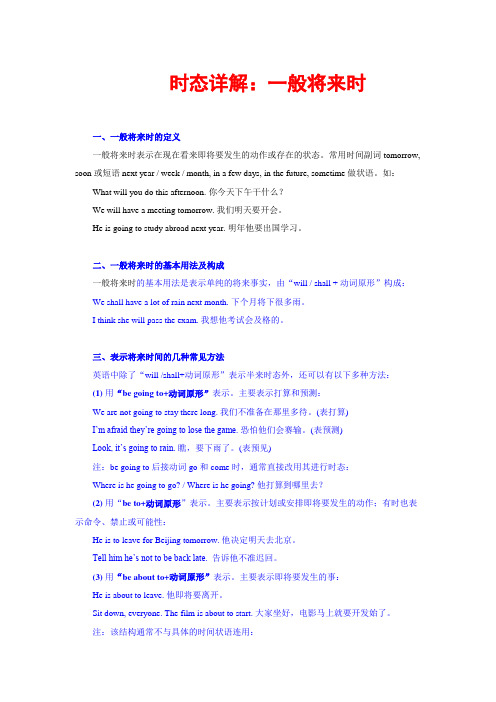
时态详解:一般将来时一、一般将来时的定义一般将来时表示在现在看来即将要发生的动作或存在的状态。
常用时间副词tomorrow, soon或短语next year / week / month, in a few days, in the future, sometime 做状语。
如:What will you do this afternoon. 你今天下午干什么?We will have a meeting tomorrow. 我们明天要开会。
He is going to study abroad next year. 明年他要出国学习。
二、一般将来时的基本用法及构成一般将来时的基本用法是表示单纯的将来事实,由“will / shall + 动词原形”构成:We shall have a lot of rain next month. 下个月将下很多雨。
I think she will pass the exam. 我想他考试会及格的。
三、表示将来时间的几种常见方法英语中除了“will /shall+动词原形”表示半来时态外,还可以有以下多种方法:(1)用“be going to+动词原形”表示。
主要表示打算和预测:We are not going to stay there long. 我们不准备在那里多待。
(表打算)I’m afraid they’re going to lose the game.恐怕他们会赛输。
(表预测)Look, it’s going to rain.瞧,要下雨了。
(表预见)注:be going to 后接动词go和come时,通常直接改用其进行时态:Where is he going to go? / Where is he going? 他打算到哪里去?(2)用“be to+动词原形”表示。
主要表示按计划或安排即将要发生的动作;有时也表示命令、禁止或可能性:He is to leave for Beijing tomorrow. 他决定明天去北京。
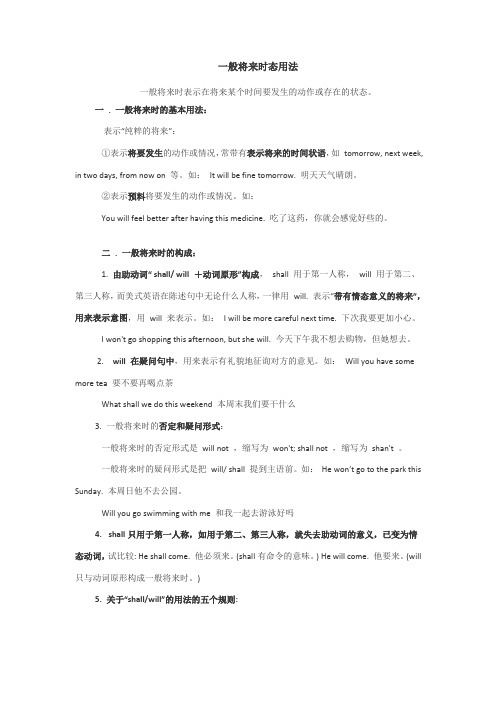
一般将来时态用法一般将来时表示在将来某个时间要发生的动作或存在的状态。
一. 一般将来时的基本用法:表示“纯粹的将来”:①表示将要发生的动作或情况,常带有表示将来的时间状语,如tomorrow, next week, in two days, from now on 等。
如:It will be fine tomorrow. 明天天气晴朗。
②表示预料将要发生的动作或情况。
如:You will feel better after having this medicine. 吃了这药,你就会感觉好些的。
二. 一般将来时的构成:1. 由助动词“ shall/ will +动词原形”构成,shall 用于第一人称,will 用于第二、第三人称,而美式英语在陈述句中无论什么人称,一律用will. 表示“带有情态意义的将来”,用来表示意图,用will 来表示。
如:I will be more careful next time. 下次我要更加小心。
I won't go shopping this afternoon, but she will. 今天下午我不想去购物,但她想去。
2. will 在疑问句中,用来表示有礼貌地征询对方的意见。
如:Will you have some more tea 要不要再喝点茶What shall we do this weekend 本周末我们要干什么3. 一般将来时的否定和疑问形式:一般将来时的否定形式是will not ,缩写为won't; shall not ,缩写为shan't 。
一般将来时的疑问形式是把will/ shall 提到主语前。
如:He won’t go to th e park this Sunday. 本周日他不去公园。
Will you go swimming with me 和我一起去游泳好吗4. shall只用于第一人称,如用于第二、第三人称,就失去助动词的意义,已变为情态动词,试比较: He shall come. 他必须来。
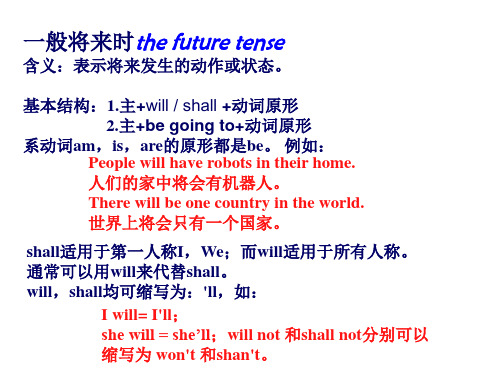

初二英语语法分析:一般将来时用法讲解一、一般将来时的概念一般将来时表示将来某个时间要发生的动作或存在的状态,也常常与表示将来时间的时间状语连用,如:tomorrow (明天),next week(下周),from now on(从现在开始),in the future(将来)等。
二、一般将来时的基本结构will + 动词原形这是表达一般将来时最常用的方法。
例句:I will go shopping tomorrow.(我明天要去购物。
)be going to + 动词原形这种结构通常用于表示计划或安排好的事情。
例句:She is going to visit her grandparents next week.(她下周要去看望她的祖父母。
)be to + 动词原形这种结构表示计划或安排,常用于官方文件或正式场合。
例句:You are to arrive at the airport at 8:00 am.(你早上8点要到达机场。
)be about to + 动词原形这种结构表示即将发生的动作,意为“正要做某事”。
例句:I am about to leave.(我正要离开。
)be due to + 动词原形这种结构表示某事预定或预期将要发生。
例句:The train is due to arrive at 5:00 pm.(火车预定下午5点到达。
)三、一般将来时的用法1表示将来的动作或状态例句:I will buy a new car next year.(明年我要买一辆新车。
)2表示将来的计划或安排例句:We are going to have a picnic this weekend.(我们这个周末要去野餐。
)3表示根据现有情况推测未来的可能性例句:It's going to rain soon.(很快就要下雨了。
)4表示命令、请求、建议等例句:You are to finish your homework before you go out.(你出去之前要把作业做完。

动词时态一般将来时的用法动词时态包含了多种不同的形式,每种形式都传达了特定的时间信息。
在英语中,一般将来时是用来表达将来发生的动作、事件或状态的。
本文将详细介绍一般将来时的用法,并提供一些例句来帮助读者更好地理解。
一、一般将来时的定义一般将来时是用来表达明确的将来发生的动作或状态。
通常使用的助动词是will或shall,根据主语的不同而定。
二、一般将来时的构成1. 肯定句结构:主语 + will + 动词原形例如:- I will go shopping tomorrow.- He will travel to Europe next week.2. 否定句结构:主语 + will + not + 动词原形,或主语 + won't + 动词原形例如:- She will not visit her grandparents this weekend.- They won't attend the party.3. 疑问句结构:Will + 主语 + 动词原形?例如:- Will you join us for dinner?- Will they arrive on time?三、一般将来时的用法1. 表达自愿或意愿一般将来时常常用来表达主观上的决定、打算或愿望。
例如:- I will help you with your project.- He will volunteer at the local charity organization.2. 表示未来的计划或安排一般将来时可用于描述预定的时间表或安排。
例如:- We will have a meeting at 9am tomorrow.- They will arrive at the airport in the evening.3. 表示预测或推测有时,我们可以根据现有的证据或情况,使用一般将来时来推测未来可能发生的事情。
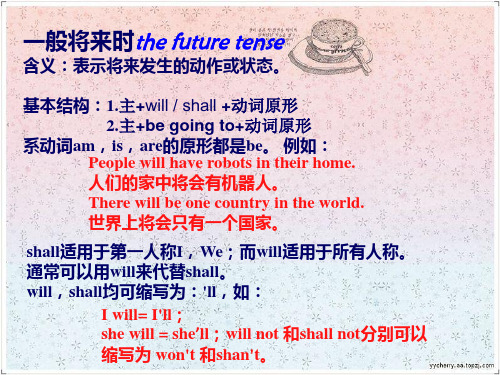
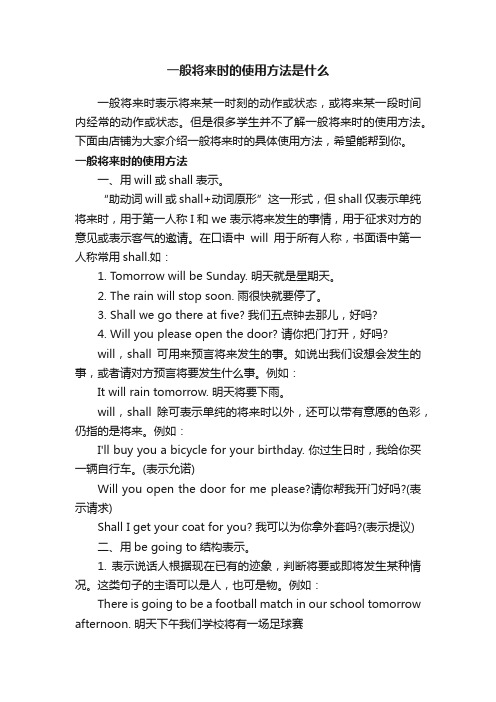
一般将来时的使用方法是什么一般将来时表示将来某一时刻的动作或状态,或将来某一段时间内经常的动作或状态。
但是很多学生并不了解一般将来时的使用方法。
下面由店铺为大家介绍一般将来时的具体使用方法,希望能帮到你。
一般将来时的使用方法一、用will或shall表示。
“助动词will或shall+动词原形”这一形式,但shall 仅表示单纯将来时,用于第一人称I和we表示将来发生的事情,用于征求对方的意见或表示客气的邀请。
在口语中will用于所有人称,书面语中第一人称常用shall.如:1. Tomorrow will be Sunday. 明天就是星期天。
2. The rain will stop soon. 雨很快就要停了。
3. Shall we go there at five? 我们五点钟去那儿,好吗?4. Will you please open the door? 请你把门打开,好吗?will,shall可用来预言将来发生的事。
如说出我们设想会发生的事,或者请对方预言将要发生什么事。
例如:It will rain tomorrow. 明天将要下雨。
will,shall除可表示单纯的将来时以外,还可以带有意愿的色彩,仍指的是将来。
例如:I'll buy you a bicycle for your birthday. 你过生日时,我给你买一辆自行车。
(表示允诺)Will you open the door for me please?请你帮我开门好吗?(表示请求)Shall I get your coat for you? 我可以为你拿外套吗?(表示提议)二、用be going to结构表示。
1. 表示说话人根据现在已有的迹象,判断将要或即将发生某种情况。
这类句子的主语可以是人,也可是物。
例如:There is going to be a football match in our school tomorrow afternoon. 明天下午我们学校将有一场足球赛(已有告示)I feel terrible.I think I'm going to die. 我感到难受极了,我想我快不行了。

关于英语一般将来时的用法一般将来时表示将来某一时段的动作或状态,或将来某一段时间内经常的动作或状态,对于平时学习英语非常重要。
接下来小编在这里给大家带来英语一般将来时的用法,我们一起来看看吧!英语一般将来时的用法一般将来时表示将来某一时刻的动作或状态,或将来某一段时间内经常的动作或状态。
常常和表示将来的时间状语连用。
一般将来时根据用法的不同可以表示多重意义,是学习者们需要掌握的知识点之一,那么这次就跟着小编一起来看看一般将来时的各种用法吧。
一. 表示将要发生的动作或情况。
eg. I will(shall) arrive tomorrow.我明天到。
二. “be going to +不定式”多用于口语中,表示打算、将要发生的事。
eg. What are you going to do tomorrow? 明天你要干什么?三. come,go等短暂性动词用“一般现在时”表示按规定、计划或时间表将要发生的事。
eg. The train arrives 13 pm. 火车下午一点到达。
四. “be +不定式”表示安排或计划好了的动作。
eg. The queen is to visit Japan next year. 女王将于明年访日。
五. “be about +不定式”表示即将发生的动作。
eg. He is about to run. 他准备开跑。
六. come,go,leave等短暂性动词在口语中用“现在进行时”表示主语计划将要作的动作。
eg. He is leaving tonight. 他计划今晚走。
七. 在以第一人称I或we作主语的问句中,一般使用助动词shall,这时或是征求对方的意见,或是询问一个情况:eg. Where shall we meet? 我们在哪儿碰头?Shall we have lessons tomorrow? 明天我们要练习吗?一般将来时的例句1、He will get married. 他就快结婚了。

一般将来时语法知识讲解一、基本概念一般将来时表示将来某一时刻的动作或状态,或将来某一段时间内经常的动作或状态。
一般将来时由助动词shall(第一人称),will(第二、三人称)+动词原形构成。
美国英语则不管什么人称,一律用will。
二、基本结构一般将来时的结构一般由“助动词will+动词原形”或“be going to+动词原形”构成。
will是助动词,不能独立使用,前面的主语不管是什么人称,其后总用will。
在名词或代词后常简缩为’ll,并与主语连写在一起。
will的否定形式是will not,缩略形式是won’t。
三、时间状语一般将来时常用的时间状语:tomorrow,tonight,the day after tomorrow,next week(month,year…),this afternoon,evening…,soon,in the year 2010,in+时间段等。
例如:Tom will come back in two days.汤姆两天后回来。
I’ll be more careful from now on.从现在起我会更加小心的。
四、基本句型(1)肯定句1)主语+will+动词原形+其他He will come here at once.他马上来这儿。
2)主语+be going to+动词原形+其他We are going to climb the hill this afternoon.我们打算今天下午去爬山。
(2)否定句1)主语+will+not+动词原形+其他He will not(won’t)go to the party.他不去参加聚会。
2)主语+be+not+going to+动词原形+其他He isn’t going to do morning exercises tomorrow.明天他不去做早操。
(3)一般疑问句1)Will+主语+动词原形+其他?Will he help you with your English?他会帮助你学习英语吗?2)Be动词(Am,Is,Are)+主语+going to+动词原形+其他?Are you going to play computer games tomorrow afternoon?你打算明天下午玩电脑游戏吗?(4)特殊疑问句:疑问词+一般疑问句?—What will the students have for lunch today?学生们今天午饭吃什么?—They will have bread.他们将吃面包。
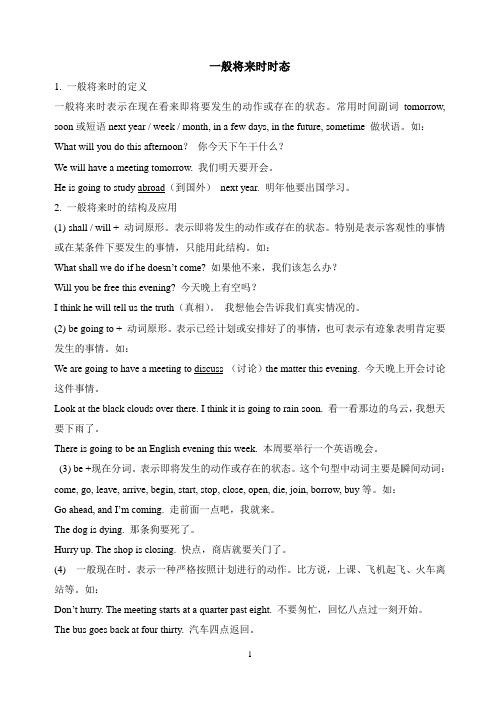
一般将来时时态1. 一般将来时的定义一般将来时表示在现在看来即将要发生的动作或存在的状态。
常用时间副词tomorrow, soon或短语next year / week / month, in a few days, in the future, sometime 做状语。
如:What will you do this afternoon?你今天下午干什么?We will have a meeting tomorrow. 我们明天要开会。
He is going to study abroad(到国外)next year. 明年他要出国学习。
2. 一般将来时的结构及应用(1) shall / will + 动词原形。
表示即将发生的动作或存在的状态。
特别是表示客观性的事情或在某条件下要发生的事情,只能用此结构。
如:What shall we do if he doesn’t come? 如果他不来,我们该怎么办?Will you be free this evening? 今天晚上有空吗?I think he will tell us the truth(真相)。
我想他会告诉我们真实情况的。
(2) be going to + 动词原形。
表示已经计划或安排好了的事情,也可表示有迹象表明肯定要发生的事情。
如:We are going to have a meeting to discuss (讨论)the matter this evening. 今天晚上开会讨论这件事情。
Look at the black clouds over there. I think it is going to rain soon. 看一看那边的乌云,我想天要下雨了。
There is going to be an English evening this week. 本周要举行一个英语晚会。
(3) be +现在分词。
表示即将发生的动作或存在的状态。

一般将来时的用法一般将来时(Simple Future Tense)是描述将来发生的事情或计划的一种时态。
在英语中,一般将来时的构成方式比较简单,一般使用助动词“will”或“be going to”来表示将来时态。
除了这两种方式外,还有其他一些用法和注意事项。
本文将详细介绍一般将来时的用法。
一、will的用法1. 表示意愿或决定:我们可以使用will表示即时决定或表示意愿。
例如:- I am thirsty. I will get some water.(我口渴了。
我要去倒些水。
)- He doesn't have a car, so I will lend him mine.(他没有车,所以我会借给他我的车。
)2. 表示预测或推测:will可用来表达对未来情况的推测或预测。
例如:- It's getting cloudy. I think it will rain soon.(天开始多云了。
我觉得很快就会下雨。
)- She is such a talented musician. I'm sure she will become famous one day.(她是一个非常有才华的音乐家。
我相信她总有一天会出名的。
)3. 提供承诺或请求:will也可以用来表示承诺或请求。
例如:- I will definitely help you with your project.(我一定会帮你完成你的项目。
)- Will you please pass me the salt?(请你把盐递给我好吗?)二、be going to的用法1. 表示计划或打算:be going to可以用来表示我们已经有了计划或打算要做某事。
例如:- I am going to visit my parents this weekend.(我打算这个周末去看望我的父母。
)- They are going to open a new restaurant in town.(他们打算在城里开一家新餐厅。

一般将来时的构造和用法一般将来时是英语中表示将来发生的动作或事件的时态。
它用来描述将来某一时间或情况下预计会发生的事情。
一般将来时的构造和用法有以下几种。
1. 肯定句结构:主语 + will + 动词原形 + 其他2. 否定句结构:主语 + will + not + 动词原形 + 其他3. 一般疑问句结构:Will + 主语 + 动词原形 + 其他?4. 特殊疑问句结构:特殊疑问词 + will + 主语 + 动词原形 + 其他?下面将分别对这些句子结构进行详细解释和示例。
1. 肯定句结构:主语 + will + 动词原形 + 其他肯定句结构用于表达预测、打算、意愿和承诺等将来发生的动作或事件。
以下是一些例句:- I will go shopping tomorrow.(我明天会去购物。
)- They will visit their grandparents next week.(他们下周会去拜访他们的祖父母。
)- She will study abroad next year.(她明年会出国留学。
)2. 否定句结构:主语 + will + not + 动词原形 + 其他否定句结构表示将来某一时间或情况下不会发生的动作或事件。
以下是一些例句:- He will not attend the meeting tomorrow.(他明天不会参加会议。
)- We will not travel to Europe next summer.(我们下个夏天不会去欧洲旅行。
)- The party will not start until 8 p.m.(晚会直到晚上8点才开始。
)3. 一般疑问句结构:Will + 主语 + 动词原形 + 其他?一般疑问句结构用来询问预测、打算、意愿和承诺等将来发生的动作或事件是否会发生。
以下是一些例句:- Will you attend the conference tomorrow?(你明天会参加会议吗?)- Will they come to our party this weekend?(他们这个周末会来我们的派对吗?)- Will she finish her project on time?(她会按时完成她的项目吗?)4. 特殊疑问句结构:特殊疑问词 + will + 主语 + 动词原形 + 其他?特殊疑问句结构用来询问关于将来动作或事件的特定信息。
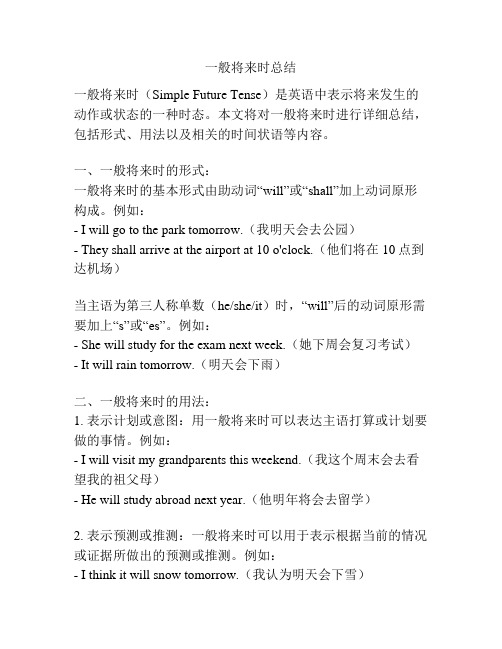
一般将来时总结一般将来时(Simple Future Tense)是英语中表示将来发生的动作或状态的一种时态。
本文将对一般将来时进行详细总结,包括形式、用法以及相关的时间状语等内容。
一、一般将来时的形式:一般将来时的基本形式由助动词“will”或“shall”加上动词原形构成。
例如:- I will go to the park tomorrow.(我明天会去公园)- They shall arrive at the airport at 10 o'clock.(他们将在10点到达机场)当主语为第三人称单数(he/she/it)时,“will”后的动词原形需要加上“s”或“es”。
例如:- She will study for the exam next week.(她下周会复习考试)- It will rain tomorrow.(明天会下雨)二、一般将来时的用法:1. 表示计划或意图:用一般将来时可以表达主语打算或计划要做的事情。
例如:- I will visit my grandparents this weekend.(我这个周末会去看望我的祖父母)- He will study abroad next year.(他明年将会去留学)2. 表示预测或推测:一般将来时可以用于表示根据当前的情况或证据所做出的预测或推测。
例如:- I think it will snow tomorrow.(我认为明天会下雪)- They believe she will win the competition.(他们相信她会赢得比赛)3. 表示意愿或允诺:一般将来时可以表达主语的意愿或承诺要做某事。
例如:- I will help you with your homework.(我会帮你做作业)- He will stop smoking.(他将戒烟)4. 表示预定的事件或安排的计划:一般将来时可以用于表示已经安排好的事件或计划。
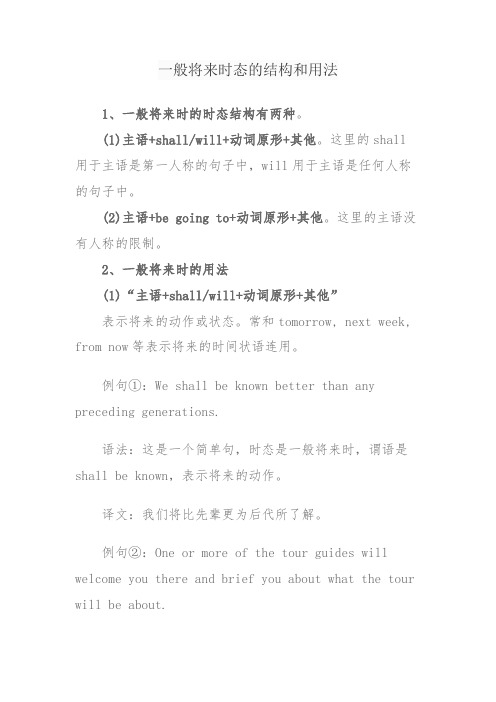
一般将来时态的结构和用法1、一般将来时的时态结构有两种。
(1)主语+shall/will+动词原形+其他。
这里的shall 用于主语是第一人称的句子中,will用于主语是任何人称的句子中。
(2)主语+be going to+动词原形+其他。
这里的主语没有人称的限制。
2、一般将来时的用法(1)“主语+shall/will+动词原形+其他”表示将来的动作或状态。
常和tomorrow, next week, from now等表示将来的时间状语连用。
例句①:We shall be known better than any preceding generations.语法:这是一个简单句,时态是一般将来时,谓语是shall be known,表示将来的动作。
译文:我们将比先辈更为后代所了解。
例句②:One or more of the tour guides will welcome you there and brief you about what the tour will be about.语法:这是一个主从复合句。
what引导的是宾语从句;主句和从句的时态都是一般将来时,谓语分别是will welcome…and brief和will be,表示将来的动作。
译文:有一个或几个导游会到那里迎接你们,并且向你们简要介绍参观的内容。
(2)“be going to+动词原形+其他”表示事先考虑过的将要发生的动作以及已有迹象表明必将要发生的某事,意为“打算,就要”。
例句:Now we go to Jane who is going to tell us about what's happening in town this weekend.语法:这是一个多重主从复合句。
who引导的是定语从句,该从句的时态是一般将来时,谓语是is going to tell;该定语从句中又包含一个由what引导的宾语从句,作介词about的宾语。
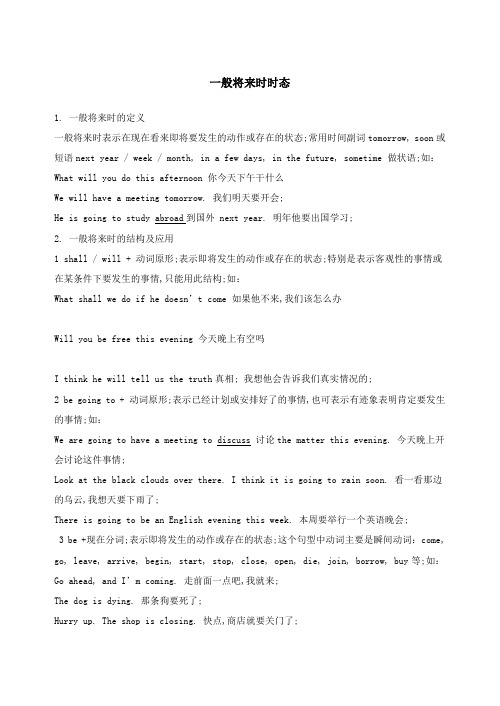
一般将来时时态1. 一般将来时的定义一般将来时表示在现在看来即将要发生的动作或存在的状态;常用时间副词tomorrow, soon或短语next year / week / month, in a few days, in the future, sometime 做状语;如:What will you do this afternoon 你今天下午干什么We will have a meeting tomorrow. 我们明天要开会;He is going to study abroad到国外 next year. 明年他要出国学习;2. 一般将来时的结构及应用1 shall / will + 动词原形;表示即将发生的动作或存在的状态;特别是表示客观性的事情或在某条件下要发生的事情,只能用此结构;如:What shall we do if he doesn’t come 如果他不来,我们该怎么办Will you be free this evening 今天晚上有空吗I think he will tell us the truth真相; 我想他会告诉我们真实情况的;2 be going to + 动词原形;表示已经计划或安排好了的事情,也可表示有迹象表明肯定要发生的事情;如:We are going to have a meeting to discuss 讨论the matter this evening. 今天晚上开会讨论这件事情;Look at the black clouds over there. I think it is going to rain soon. 看一看那边的乌云,我想天要下雨了;There is going to be an English evening this week. 本周要举行一个英语晚会;3 be +现在分词;表示即将发生的动作或存在的状态;这个句型中动词主要是瞬间动词:come, go, leave, arrive, begin, start, stop, close, open, die, join, borrow, buy等;如:Go ahead, and I’m coming. 走前面一点吧,我就来;The dog is dying. 那条狗要死了;Hurry up. The shop is closing. 快点,商店就要关门了;4 一般现在时;表示一种严格按照计划进行的动作;比方说,上课、飞机起飞、火车离站等;如:Don’t hurry. The meeting starts at a quarter past eight. 不要匆忙,回忆八点过一刻开始;The bus goes back at four thirty. 汽车四点返回;巩固练习:一、用所给动词的适当形式填空1.Li Lei tells me he _________________visitthe Great Wall长城this weekend.2.My mother _________________buyme a pair of new trousers tomorrow.3.She says she _________________leavesoon.4.We _________________go skating if it doesn’t rain next Sunday.5.There _________________bean English evening next week.6.Think over, and you _________________geta good idea.7.——___________Jim ___________havea picnic next Monday——-No, he __________.8.I _________________missyou after you leave here.9.Who _________________teachyou English next year10.He _________________ be back in three hours.11.Look at these clouds. It ___________________ rain.二、改错:每处划线中有错误,在题后改正1.He will sing anddancesfor us tomorrow.2.Are you going to swim ------Yes, Iwill.3.He will help Jim with his Englishevery day.4.Will her sistersingsa song for me tomorrow5.They willn’t plant trees next week.6.Are they going toplaysbasketball tomorrow7.Willwe go to visit the factory tomorrow8.Paulwill be going tomake dumplings for Emma.9.Are the boys going to the Great Wall next month ------Yes, theywill.三、句型转换:Jimis going to play footballtomorrow.Marywill clean the windowsnext week.否定句:____________________________ ______________________________一般疑问句:_____________________________ ______________________________两回答:___________________________ _____________________________特殊疑问句:______________________ _____________________________四、选择题1. —Are you going to _______ our English team—Yes, I am.A. take part inB. joinC. took part inD. joined2. Xu Xia and her teammates are _______ the USA next week.A. leaving forB. leave forC. leaveD. left3. There _______ an English party in our class next week.A. is going to haveB. is going to beC. will haveD. Have4. If it _______ tomorrow, we will go to the park.A. isn’t rainB. don’t rainC. doesn’t rainD. won’t rain5. There ______ a football match next week. Shall we go and watch itA. will haveB. hasC. haveD. will be“Would you mind doing…”句型透视mind用作动词时,习惯后接动名词短语作宾语,而不接动词不定式,常用于Would you mind doing…句型中,具体用法是:1. “Would you mind doing…”句型常用于表示请求,意思是“请你做……你是否介意、请你做……好吗”,是一种比较客气的表达方式;如:Would you mind turning off the light in the room请你把房间里的灯关掉好吗如果要表示“请你不要做……你是否介意、请你不要做……好吗”,只需要在doing前面加上not.如:Would you mind not standing in front of me请你不要站在我的前面好吗2. 如果同意,表示不介意时,可用如下用语来表达:Certainly/Of course not./Not at all./No, not at all;如果不同意,表示介意时,常用“Sorry/I‘m sorry.”对不起及陈述某种理由来表示拒绝或反对;如:—Would you mind going to the movies this evening今晚去看电影好吗—I‘m sorry. But I haven’t finished my homework yet.对不起,我的作业还没有完成;学习时还要注意:1.“Would you mind doing…”句型中的would也可用do代替,但语气较生硬,不如用would客气;2.“Would you mind doing…”句型中的逻辑主语只能是谈话的对方you.如果想要对方允许自己做某事,可用“Would you mind my doing…”句型,如:Would you mind my smoking here你介意我在这里吸烟吗巩固练习:一、用下面提供的短语完成句子;1. help me wash my clothesWould you mind ______________________________2. give her a cup of teaWould you mind _______________________________3. help him mend his carDo you have _______________________________4. walk on the roadWould you mind _______________________________ on the road二、选择题1. —Would you mind _______ us in the game—Not at all.A. joiningB. joinC. join inD. joining in2. —Would you like to climb mountains with me this Sunday—I’d love to. But I _______ play table tennis against Class Three.A. am goingB. am going toC. amD. going to3. —Would you mind _______here—I’m sorry about that. I’ll go somewhere else.A. no smokingB. not smokingC. no smokeD. not smoke1. had better 的基本用法特点其意为“最好”、“应该”,后接动词原形,与情态动词should用法相似,其中的had 通常缩略为’d:You’d better get some sleep.你最好去睡一会儿;Wego before it rains.我们最好在下雨前就去;2. had better如何构成否定式和疑问式构成否定式时,通常将not置于had better之后而不是had之后;而构成疑问式时,则通常将had而不是had better置于主语之前:I’d better not disturb him.我最好别去打扰他;What had we better do我们最好怎么办练习题1. —I’m afraid you have a cold. You’d better go to see a doctor.—_______A. No, I have no time.B. That’s a good idea.C. It’s very kind of you.D. I’m sorry to hear that.2. —I’m fat. What should I do—You’d better eat _______ meat and _______ fruits.A. less; moreB. less; lessC. more; lessD. more; more3. You had better ask your brother _______ playing computer games. It’s badfor him.A. to give upB. not to give upC. to give it upD. not give it up4. —I have a stomachache. What should I do—You _______ drink sweet water and _______ eat sweet food.A. had better not; shouldn’tB. should; had betterC. had better; had betterD. shouldn’t; should5. —I have a toothache.—You should _______.A. drink lots of waterB. take a restC. see a dentistD. have a good sleep情态动词的基本用法归纳情态动词有can could, may might, must, have to, shall should, will would, need needed, ought to等; 情态动词无人称和数的变化;不能单独使用,必须与其后的动词原形构成谓语;一、 can, could1. 表示能力体力、知识、技能;Can you lift this heavy box体力Mary can speak three languages.知识Can you skate技能2.表示请求和允许;-----Can I go now----- Yes, you can. / No, you can’t.此时可与may互换;在疑问句中还可用could,might代替,不是过去式,只是语气更委婉,不能用于肯定句和答语中;---- Could I come to see you tomorrow---- Yes, you can. No, I’m afraid not.3.表示客观可能性客观原因形成的能力;They’ve changed the timetable, so we can go by bus instead.This hall can hold 500 people at least.4.表示推测惊讶、怀疑、不相信的态度,用于疑问句、否定句和感叹句中;Can this be trueThis can’t be done by him.How can this be true二、 may, might1. 表示请求和允许;might比 may语气更委婉,而不是过去式;否定回答时可用can’t或mustn’t,表示“不可以,禁止”;----Might/ May I smoke in this room---- No, you mustn’t.---- May/Might I take this book out of the room---- Yes, you can. No, you can’t / mustn’t.用May I...征徇对方许可时比较正式和客气,而用Can I...在口语中更常见;2.用于祈使句,表示祝愿;May you succeed3. 表示推测、可能性不用于疑问句;might不是过去式,它所表示的可能性比may小;1.He may /might be very busy now.2.Your mother may /might not know the truth.三、 must, have to1. 表示必须、必要;You must come in time.在回答引出的问句时,如果是否定的,不能用mustn’t禁止,不准,而用needn’t, don’t have to不必.---- Must we hand in our exercise books today---- Yes, you must.---- No, you don’t have to / you needn’t.2. must是说话人的主观看法, 而have to则强调客观需要;must只有一般现在时, have to 有更多的时态形式;1 he play isn’t interesting, I really must go now.2 I had to work when I was your age.3.表示推测、可能性只用于肯定的陈述句1 You’re Tom’s good friend, so you must know what he lik es best.2 Your mother must be waiting for you now.四、need1.need 作情态动词用时, 常用于疑问句、否定句;在肯定句中一般用must, have to, ought to, should代替;1You needn’t come so early.2 ---- Need I finish the work today---- Yes, you must. / No, you needn’t.2. need作实义动词用时, 有人称、时态和数的变化;而need后面只能接带to的不定式;He needs to finish his homework today.五、 shall, should1.shall 用于第一人称,征求对方的意见;What shall we do this evening2.shall 用于第二、三人称,表示说话人给对方的命令、警告、允诺或威胁;1.You shall fail if you don’t work hard.警告2He shall have the book when I finish it.允诺3He shall be punished.威胁六、 will, would1.表示请求、建议等,would更委婉;Will / Would you pass me the ball, please2..表示意志、愿望和决心;1. I will never do that again.2. They asked him if he would go abroad.3. would表示过去反复发生的动作或某种倾向;would表示过去习惯时比used to正式,且没有“现已无此习惯”的含义;1. During the vacation, he would visit me every other day.2. The wound would not heal.七、 should1.should表示“应该”1. I should help her because she is in trouble.2.表示推测should , 客观推测, must主观推测;1.He must be home by now. 断定他已到家2He ought to/should be home by now.不太肯定3 This is where the oil must be.直爽4This is where the oil ought to/should be.含蓄练习题1. —May I ask you some questions, Dr. Wang—_______A. You’re welcome.B. Sure, go ahead.C. No, I’m busy.D. Yes, you must.2. —Must I take part in the activity—No, you _______. You’re too young. You should look after yourself.A. mustn’tB. don’tC. can’tD. don’t have to3. —May I watch TV, Mom—I’m afrai d you _______.A. should notB. can’tC. must notD. may not4. —Must we keep the window _______ all the time—No, you don’t have to.A. openingB. openedC. to openD. open5. —Must I take the medicine every day—No, you _______.A. mustB. mustn’tC. needn’tD. can’t6. My mother is ill. I _______ stay at home to take care of her.A. canB. mayC. have toD. maybe7. —May I use your dictionary, Lily—Sure, _______.A. go aheadB. you can ask BillC. you can’tD. that’s all right反身代词用法归纳一、反身代词的基本形式反身代词是 oneself根据所指词的人称、性别、单复数等的变化可以有 myself, himself, herself, yourself, itself, ourselves, yourselves, themselves 等形式;二、oneself与himself当one指人时,其相应的反身代词通常用oneself, 在美国英语中也可用himself:One should not praise oneself himself. 一个人不应该自吹自擂;三、反身代词的句法功能:1. 用作同位语加强被修饰词的语气,紧放在被修饰名词后, 或句末:The box itself is not so heavy. 箱子本身并不重;Martin himself attended the sick man. 马丁亲自照顾病人;2. 用作宾语动词或介词的宾语:Take good care of yourself. 照顾好自己;She could not make herself understood. 她不能使别人听懂她的话;The child cried himself to sleep. 孩子哭着哭着睡着了;3. 用作表语The poor boy was myself. 那个可怜的孩子就是我自己;The ones who really want it are ourselves. 真正想要它的是我们自己;1. —He plays basketball so well Who taught _______—He learnt it by _______.A. him; himB. himself; himselfC. him; himselfD. himself; him要求四会的单词名词体育运动team match football tennis baseballskating rowing cycling basketball soccer人物或称谓类person player musician scientist pilotpoliceman policewoman postman fishermanhero grandfather grandmother grandparents物品类basket cup paper gold record brush ring处所类grass theatre/theater museum factory身体健康类body health toothache headache fevercough stomachache illness medicine heart食品饮料类coffee tea candy fruit sugartomato+es potato+es salt watermelon sandwichstrawberry beef biscuit meal时间类age century weekend文化信息类information website Internet dictionaryknowledge message passage culture其他shower fact care advicea piece of advice news pityarticle smoke risk question habitworldwar introduction note smile peacesouth middle taxi answer litter voice score line phone example skillpoint chance suggestion mind sidedream future friendship jump part形容词或副词weak←→strong least ←→most popular←→unpopularhealthy =fit←→ill fat ←→thin dirty←→cleanuseful←→ useless dark←→bright hungry←→ fulldead←→alive cheap ←→expensive=dear true←→ falsecorrect←→ wrong possible ←→impossible quiteexcited /exciting tired/tiringcertainly badly really finally evenfamous mad angry main successful enough terrible serious still funny active modern necessary动词:win cheer row join skate cycledream grow spend jump relaxleave kick pass throw fightenjoy/practice/ finish/ mind +doing sth. advise killinvent become follow hold scorepoint hit hear ring stand feel break record suggest lift boil brushlie cry care check worry causesmoke taste force risk build happen介词against through without off except词组荟萃名词词组table tennis the day after tomorrow day and nightice cream potato chips first aid relay race动词词组cheer...on grow up be good forbe good at=do w ell in←→do badly in take part in keepfit leave for fall ill give sb. a hand shout at sb.do one’s best=try one’s best be angry with talkaboutcome into being stand for have a cold liedownworry about go ahead build sb. up takecare of介词词组及其他for example at least in fact as...aspossible in the futureon the other hand instead of all overat first课本中出现的词组或搭配归纳be able to be sure be interested in see sb.do/doing sthjoin the school rowing team join sb spend ...doing sththe high jump the long jump turn ... into... make sb./sth. +adj. all over the world help sb. dosth play against have funthe most popular sports stop sb from doing sth. such as/for examplehundreds of years the boys’ 800-meter race lots of =a lot ofmake friends with sb. win the first place nexttimelook/ get well/better take one’s advicetake medicine take/have a bath have/take a restfeel like doing sth. go up go outfall down nothing serious stay uphave a good rest do morning/eye exercises tell/ask sbto do sth.give up show sb. sth.= show sth. to sb. too much重句大本营1.—What are you going to do—I’m going to play basketball.2.—Would you like to come and cheer us on—Sure,I’d love to.3.—Which sport do you prefer, swimming or rowing—I prefer rowing.4.—Are you going to join the school rowing team—Yes, I am./ No, I’m not.5.—What’s your favorite sport, ________—Basketball, of course.6.—Who’s your favorite player—LeBron James.7.—What are you going to be when you grow up—I’m going to be a scientist.8.—Why do you like playing soccer—Because it makes him strong and it’s popular all over the world.9.—_______, could you help me=give me a hand, please—Sure.10.—Will you join us—I’d be glad to.11.—Would you mind teaching me—Not at all. You can do it12.—Would you mind not putting your bike here—Sorry. I’ll put it somewhere else.13.—_______, I am sorry for what I said.宾语从句—It’s nothing.14.—Will you take part in the school sports meet—Of course I will.15.—Which sport will you take part in—The boys’ 800-meter race.16.—Hello, is _______ in—Speaking.17.—What shall we take—We’ll take our sp orts clothes and sports shoes.18.—Shall I take my camera—Good idea It’ll be fun19.—When shall we meet—Let’s make it half past six.20.—Where shall we meet—At my house.21.—Hello, _________ You don’t look well. What’s wrong withyou=What’s the matter with you=What is the matter with you—I have a toothache/backache/stomachache/headache/fever.I have the flu.22.—I hope you’ll get well soon.—Thank you.23.—How long have you been like this—Two days./For two days.24.—You’d better take some medicine.—I think I will.25.—How are you feeling today—Not too bad.26.—Staying up late is bad for your health.—Right I must have a good rest.27.—May I ask you some questions, Dr. Li—Sure, go ahead.28.—Must we go to see a doctor at once when we have the flu—Yes, we must./No, we needn’t.we don’t have to.29.—Could I speak to Dr. Li Yuping30.—I’m afraid he is busy right now.—Can I leave a message—Sure, go ahead.其他重要句型1.She spends half an hour exercising in the gym every day.2.There is going to be a school sports meet next weekend.3.They are leaving for Japan the day after tomorrow.4.Basketball is one of the most popular sports in the United States andother parts of the world.5.It’s important for you and the other players to play as a team.6.With hundreds of years’ history,it is one of the most popular sportsin England.7.The Summer Olympics and Winter Olympics are both held every fouryears.8.You’d better stay in bed and not move your left leg too much.9.Follow the doctor’s advice, and you’ll get well soon.=If you followthe doctor’s advice, you’ll get well soon.10.Be careful not to eat too much salt or sugar.11.But his mother made him taste it.12.They must give up smoking as soon as possible.13.Playing sports can also help you keep fit.。
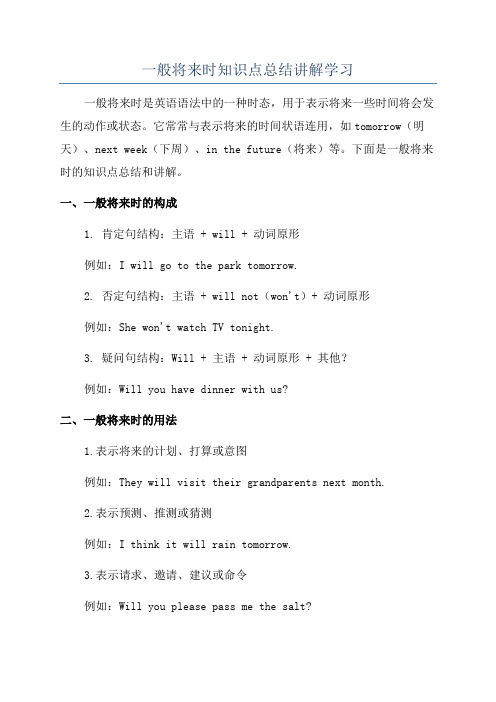
一般将来时知识点总结讲解学习一般将来时是英语语法中的一种时态,用于表示将来一些时间将会发生的动作或状态。
它常常与表示将来的时间状语连用,如tomorrow(明天)、next week(下周)、in the future(将来)等。
下面是一般将来时的知识点总结和讲解。
一、一般将来时的构成1. 肯定句结构:主语 + will + 动词原形例如:I will go to the park tomorrow.2. 否定句结构:主语 + will not(won't)+ 动词原形例如:She won't watch TV tonight.3. 疑问句结构:Will + 主语 + 动词原形 + 其他?例如:Will you have dinner with us?二、一般将来时的用法1.表示将来的计划、打算或意图例如:They will visit their grandparents next month.2.表示预测、推测或猜测例如:I think it will rain tomorrow.3.表示请求、邀请、建议或命令例如:Will you please pass me the salt?4.表示承诺、威胁或警告例如:I will help you with the project.5.在主句中的时间状语从句中,一般将来时常常用于表示将来的动作或状态。
例如:I will go shopping when I finish my work.三、一般将来时的注意事项1.一般将来时表示先于现在或过去的将来动作或状态,与现在的决定或打算无关。
例如:I will study abroad next year. (现在决定)2. be动词的一般将来时构成为will be,否定形式为will not be (won't be)。
例如:He will be at home tomorrow.3.一般将来时常常与表示将来的时间状语连用。
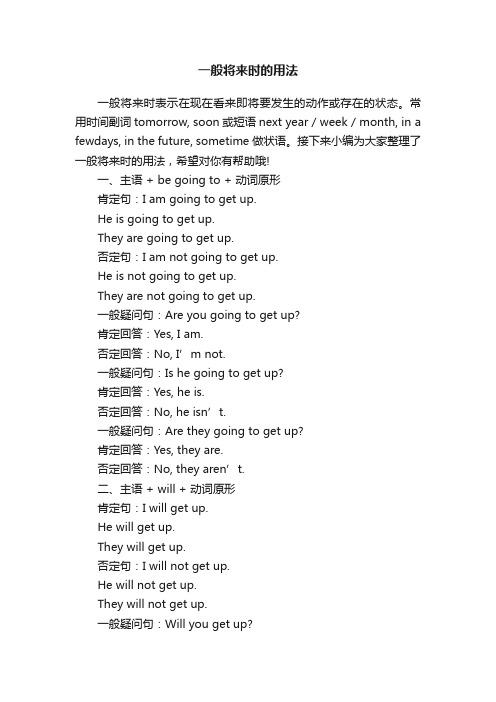
一般将来时的用法一般将来时表示在现在看来即将要发生的动作或存在的状态。
常用时间副词tomorrow, soon或短语next year / week / month, in a fewdays, in the future, sometime 做状语。
接下来小编为大家整理了一般将来时的用法,希望对你有帮助哦!一、主语 + be going to + 动词原形肯定句:I am going to get up.He is going to get up.They are going to get up.否定句:I am not going to get up.He is not going to get up.They are not going to get up.一般疑问句:Are you going to get up?肯定回答:Yes, I am.否定回答:No, I’m not.一般疑问句:Is he going to get up?肯定回答:Yes, he is.否定回答:No, he isn’t.一般疑问句:Are they going to get up?肯定回答:Yes, they are.否定回答:No, they aren’t.二、主语 + will + 动词原形肯定句:I will get up.He will get up.They will get up.否定句:I will not get up.He will not get up.They will not get up.一般疑问句:Will you get up?肯定回答:Yes, I will.否定回答:No, I won’t.一般疑问句:Will he get up.肯定回答:Yes, he will.否定回答:No, he won’t.一般疑问句:Are they going to get up?肯定回答:Yes, they are.否定回答:No, they aren’t.一般将来时/式(The Simple Future tense)时态定义be going to表主观的打算shall和will常常缩写成'll ,紧接在主语之后。

一般将来时的结构和用法及讲解一般将来时是英语中用来表示将来发生的动作或状态的一种时态。
它通常由助动词"will"或"shall"和动词的原形构成。
以下是关于一般将来时的结构和用法的详细讲解:1. 结构:主语 + will/shall + 动词原形+ …。
2. 肯定句的结构:主语 + will/shall + 动词原形 + 其他成分(宾语、状语等)。
3. 否定句的结构:主语 + will not (won't) / shall not (shan't) + 动词原形 + 其他成分。
4. 疑问句的结构:Will/Shall + 主语 + 动词原形 + 其他成分?5. 用法:a. 表示未来的事实、计划或意图,例如,“I will call you later.”(我稍后会给你打电话。
)。
b. 表示预测或假设,例如,“It will rain tomorrow.”(明天会下雨。
)。
c. 表示意愿、请求或承诺,例如,“I will help you with your homework.”(我会帮你做作业。
)。
d. 表示决定,例如,“I will buy a new car.”(我决定买辆新车。
)。
一般将来时的用法相对灵活,可以根据语境和需要进行灵活运用。
需要注意的是,一般将来时中的助动词"will"在口语中常缩写为"‘ll",而否定形式则缩写为"won't"。
同时,在一般将来时中,shall通常用于第一人称(I 和 we),而will则用于其他人称。
在现代英语中,shall的使用已经相对较少,通常用will来表示一般将来时。
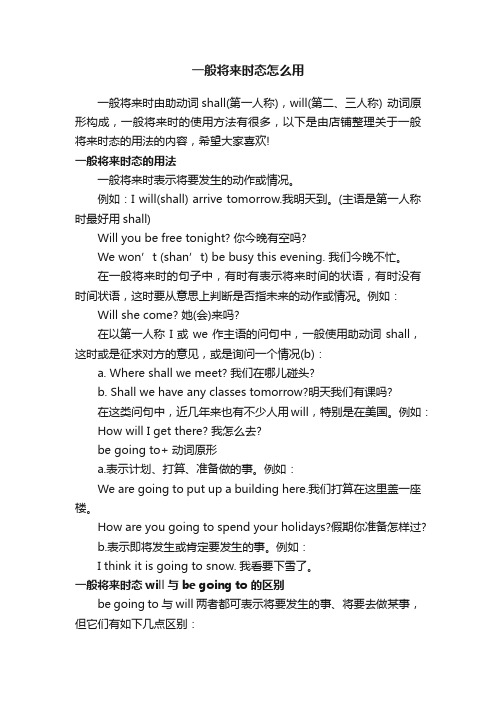
一般将来时态怎么用一般将来时由助动词shall(第一人称),will(第二、三人称) 动词原形构成,一般将来时的使用方法有很多,以下是由店铺整理关于一般将来时态的用法的内容,希望大家喜欢!一般将来时态的用法一般将来时表示将要发生的动作或情况。
例如:I will(shall) arrive tomorrow.我明天到。
(主语是第一人称时最好用shall)Will you be free tonight? 你今晚有空吗?We won’t (shan’t) be busy this evening. 我们今晚不忙。
在一般将来时的句子中,有时有表示将来时间的状语,有时没有时间状语,这时要从意思上判断是否指未来的动作或情况。
例如:Will she come? 她(会)来吗?在以第一人称I或we作主语的问句中,一般使用助动词shall,这时或是征求对方的意见,或是询问一个情况(b):a. Where shall we meet? 我们在哪儿碰头?b. Shall we have any classes tomorrow?明天我们有课吗?在这类问句中,近几年来也有不少人用will,特别是在美国。
例如:How will I get there? 我怎么去?be going to+ 动词原形a.表示计划、打算、准备做的事。
例如:We are going to put up a building here.我们打算在这里盖一座楼。
How are you going to spend your holidays?假期你准备怎样过?b.表示即将发生或肯定要发生的事。
例如:I think it is going to snow. 我看要下雪了。
一般将来时态will与be going to 的区别be going to与will两者都可表示将要发生的事、将要去做某事,但它们有如下几点区别:1. be going to 表示将要发生的事情,will 表示的时间则较远一些,如:He is going to write a letter tonight.He will write a book one day.2. be going to 表示根据主观判断将来肯定发生的事情,will表示客观上将来势必发生的事情。
一般将来时时态1. 一般将来时的定义一般将来时表示在现在看来即将要发生的动作或存在的状态。
常用时间副词tomorrow, soon或短语next year / week / month, in a few days, in the future, sometime 做状语。
如:What will you do this afternoon 你今天下午干什么We will have a meeting tomorrow. 我们明天要开会。
He is going to study abroad(到国外)next year. 明年他要出国学习。
2. 一般将来时的结构及应用(1) shall / will + 动词原形。
表示即将发生的动作或存在的状态。
特别是表示客观性的事情或在某条件下要发生的事情,只能用此结构。
如:What shall we do if he doesn’t come? 如果他不来,我们该怎么办Will you be free this evening? 今天晚上有空吗I think he will tell us the truth(真相)。
我想他会告诉我们真实情况的。
(2) be going to + 动词原形。
表示已经计划或安排好了的事情,也可表示有迹象表明肯定要发生的事情。
如:We are going to have a meeting to discuss (讨论)the matter this evening. 今天晚上开会讨论这件事情。
Look at the black clouds over there. I think it is going to rain soon. 看一看那边的乌云,我想天要下雨了。
There is going to be an English evening this week. 本周要举行一个英语晚会。
(3) be +现在分词。
表示即将发生的动作或存在的状态。
这个句型中动词主要是瞬间动词:come, go, leave, arrive, begin, start, stop, close, open, die, join, borrow, buy等。
如:Go ahead, and I’m coming. 走前面一点吧,我就来。
The dog is dying. 那条狗要死了。
Hurry up. The shop is closing. 快点,商店就要关门了。
(4) 一般现在时。
表示一种严格按照计划进行的动作。
比方说,上课、飞机起飞、火车离站等。
如:Don’t hurry. The meeting starts at a quarter past eight. 不要匆忙,回忆八点过一刻开始。
The bus goes back at four thirty. 汽车四点返回。
巩固练习:一、用所给动词的适当形式填空1.?Li Lei tells me he _________________(visit)the Great Wall(长城)?this weekend.2.?My mother _________________(buy)me a pair of new trousers tomorrow.3.?She says she _________________(leave)soon.4.?We _________________(go) skating if it doesn’t rain next Sunday.5.?There _________________(be)an English evening next week.6.??Think over, and you _________________(get)a good idea.7.??——?___________Jim ___________(have)a picnic next Monday?——-No, he __________.8.??I _________________(miss)you after you leave here.9.??Who _________________(teach)you English next year10.??He _________________ (be) back in three hours.11.???Look at these clouds. It ___________________ (rain).二、改错:每处划线中有错误,在题后改正1.?He will sing and?dances?for us tomorrow.2.?Are you going to swim? ------Yes, I?will.3.??He will help Jim with his English?every day.4.??Will her sister?sings?a song for me tomorrow?5.??They?willn’t?plant trees next week.6.??Are they going to?plays?basketball tomorrow?7.??Will?we go to visit the factory tomorrow?8.???Paul?will be going to?make dumplings for Emma.9.??Are the boys going to the Great Wall next month? ------Yes, they?will.三、句型转换:Jim?is going to play football?tomorrow.????Mary?will clean the windows?next week.否定句:____________________________????????? ???______________________________一般疑问句:_____________________________???????????______________________________两回答:___________________________???????????? ??_____________________________ 特殊疑问句:______________________?????????????? ??_____________________________四、选择题( )1. —Are you going to _______ our English team?—Yes, I am.A. take part inB. joinC. took part inD. joined( )2. Xu Xia and her teammates are _______ the USA next week.A. leaving forB. leave forC. leaveD. left( )3. There _______ an English party in our class next week.A. is going to haveB. is going to beC. will haveD. Have( ) 4. If it _______ tomorrow, we will go to the park.A. isn’t rainB. don’t rainC. doesn’t rainD. won’t rain( )5. There ______ a football match next week. Shall we go and watch it?A. will haveB. hasC. haveD. will be“Would you mind doing…”句型透视mind用作动词时,习惯后接动名词(短语)作宾语,而不接动词不定式,常用于Would you mind doing…句型中,具体用法是:1. “Would you mind doing…”句型常用于表示请求,意思是“请你做……你是否介意、请你做……好吗”,是一种比较客气的表达方式。
如:Would you mind turning off the light in the room请你把房间里的灯关掉好吗如果要表示“请你不要做……你是否介意、请你不要做……好吗”,只需要在doing前面加上not.如:Would you mind not standing in front of me请你不要站在我的前面好吗2. 如果同意,表示不介意时,可用如下用语来表达:Certainly/Of course not./Not at all./No,not at all;如果不同意,表示介意时,常用“Sorry/I‘m sorry.”(对不起)及陈述某种理由来表示拒绝或反对。
如:—Would you mind going to the movies this evening今晚去看电影好吗—I‘m sorry. But I haven’t finished my homework yet.对不起,我的作业还没有完成。
学习时还要注意:1.“Would you mind doing…”句型中的would也可用do代替,但语气较生硬,不如用would客气。
2.“Would you mind doing…”句型中的逻辑主语只能是谈话的对方you.如果想要对方允许自己做某事,可用“Would you mind my doing…”句型,如:Would you mind my smoking here你介意我在这里吸烟吗巩固练习:一、用下面提供的短语完成句子。
1. help me wash my clothesWould you mind ______________________________2. give her a cup of teaWould you mind _______________________________3. help him mend his carDo you have _______________________________4. walk on the roadWould you mind _______________________________ on the road二、选择题( )1. —Would you mind _______ us in the game?—Not at all.A. joiningB. joinC. join inD. joining in( )2. —Would you like to climb mountains with me this Sunday?—I’d love to. But I _______ play table tennis against Class Three.A. am goingB. am going toC. amD. going to( )3. —Would you mind _______here?—I’m sorry about that. I’ll go somewhere else.A. no smokingB. not smokingC. no smokeD. not smokehad better用法详解?1. had better 的基本用法特点其意为“最好”、“应该”,后接动词原形,与情态动词should用法相似,其中的had通常缩略为?’d:You’d better get some sle ep.你最好去睡一会儿。